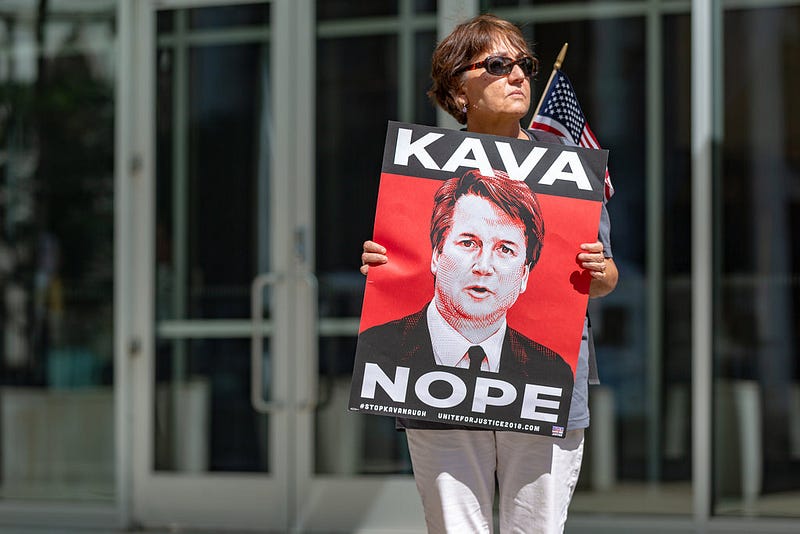by Amanda Kim ’21, News Editor

Trump generates controversy
President Donald Trump is currently facing criticism from both Democrats and Republicans for allegedly mocking Christine Blasey Ford, who recently accused Trump’s Supreme Court nominee Brett Kavanaugh of sexually assaulting her in 1982.
At his rally in Mississippi on Oct. 2, Trump appeared to deride Ford’s inability to remember key details surrounding the incident, exclaiming to the crowd: “Where’s the house? I don’t know! Upstairs, downstairs, where was it? I don’t know! But I had one beer. That’s the only thing I remember. And a man’s life is in tatters.” Experts have said it is not unusual for victims of trauma to fail to remember certain details of an incident, and Trump’s remarks were met with criticism from both major parties. Senate Democratic leader Chuck Schumer called it “outright mockery of a sexual assault survivor,” while Republican senator Susan Collins described Trump’s comments as “just plain wrong.” This is not the first time that the President has questioned
Ford’s credibility — he tweeted on Sept. 21 that he had “no doubt that, if the attack on Dr. Ford was as bad as she says, charges would have been immediately filed with local Law Enforcement Authorities by either her or her loving parents.” Two other women — Deborah Ramirez and Julie Swetnick — have also come forward with allegations of sexual assault against Kavanaugh.
Senate Majority Leader Mitch McConnell has stated the Senate will vote on Kavanaugh’s nomination this week as the FBI continues its supplemental investigation. The Republican party currently holds a 51–49 majority in the Senate. Following a rule change made by McConnell in 2017, Supreme Court nominees may be advanced on a simple majority vote.
Devastation in Indonesia
On Sept. 28, the island of Sulawesi in Indonesia experienced a 7.5 magnitude earthquake and was then further ravaged by a subsequent tsunami that reached a height of 20 feet. An estimated 66,000 homes have been destroyed or damaged and the death toll has now gone past 1,400 (as of Oct. 3, the death
toll stood at 1,407). That number includes the 34 bodies — most of them children — found on Monday in a church recreation hall as rescuers searched for 86 children that had been taking part in a bible camp when the earthquake and tsunami hit. The United Nations’ humanitarian office has warned of “vast” unmet needs in the hardest-hit areas outside of the city of Palu, stating that almost 200,000 people need urgent help. Officials are currently trying to identify what went wrong with the country’s tsunami detection system, which was unable to adequately predict the scale of the tsunami. The detection system triggered a tsunami warning in response to the 7.5 magnitude of the earthquake, but only predicted that the tsunami would only reach heights of 1.6 to 9.8 feet. Meanwhile, the overall death toll is expected to continue rising; Willem Rampangilei, who leads Indonesia’s National Board for Disaster Management, has told reporters that “so many bodies haven’t been recovered yet.”
Iran Deal fallout
The International Court of Justice (ICJ) ruled on Oct. 3 that the United States must ease some of the sanctions imposed on Iran after the US abandoned a 2015 international accord that limited Iran’s nuclear ambitions in May 2018. The ICJ’s ruling states that the US must remove “any impediments” to the export of humanitarian goods, including food, medicine, and aviation safety equipment. This ruling comes after a lawsuit filed by Iran against the United States, in which Iran argued against new American economic sanctions imposed by the Trump administration after it withdrew from the aforementioned nuclear agreement. Iran argues in the lawsuit that the sanctions violate the 1955 Treaty of Amity, Economic Relations, and Consular Rights between Iran and the US, a treaty that was supposed to support the normalization of relations between the two countries. That treaty granted the ICJ, which is the main judicial organ of the UN, jurisdiction over disputes. Though the ICJ’s rulings are binding, the court holds no power to enforce them. In response to the ICJ’s decision, Secretary of State Mike Pompeo announced on Oct. 3 that the United States will be pulling out of the 1955 treaty.

















